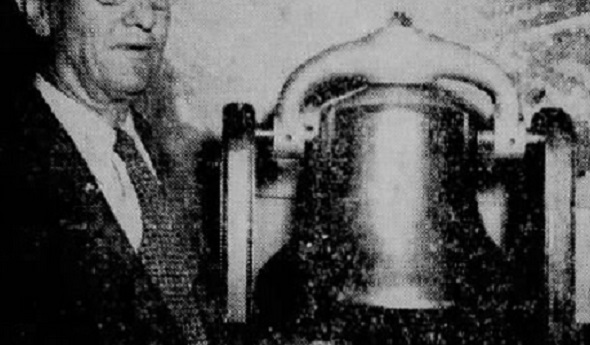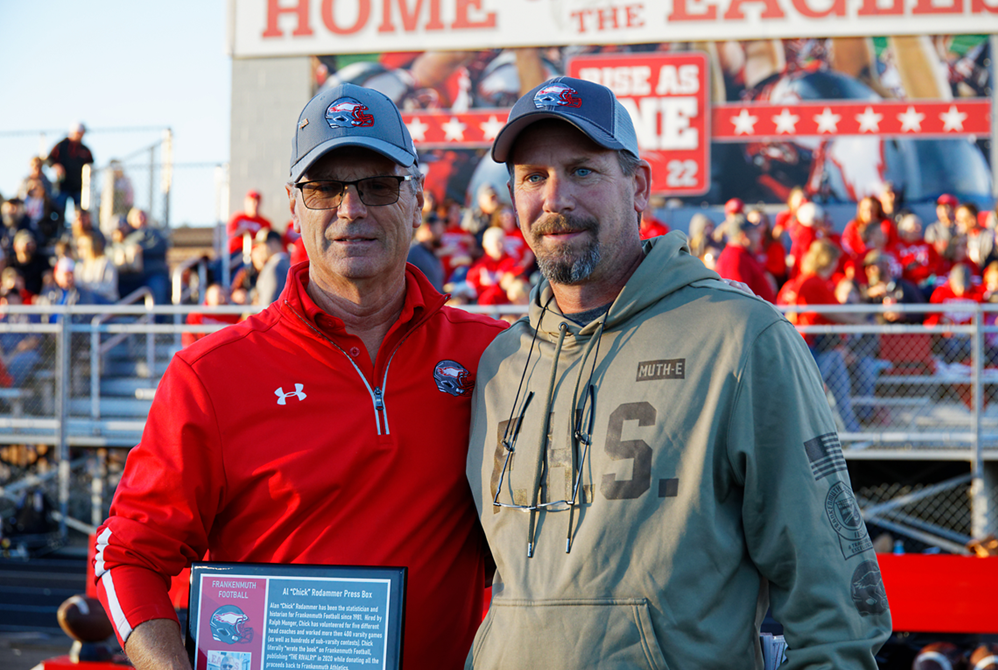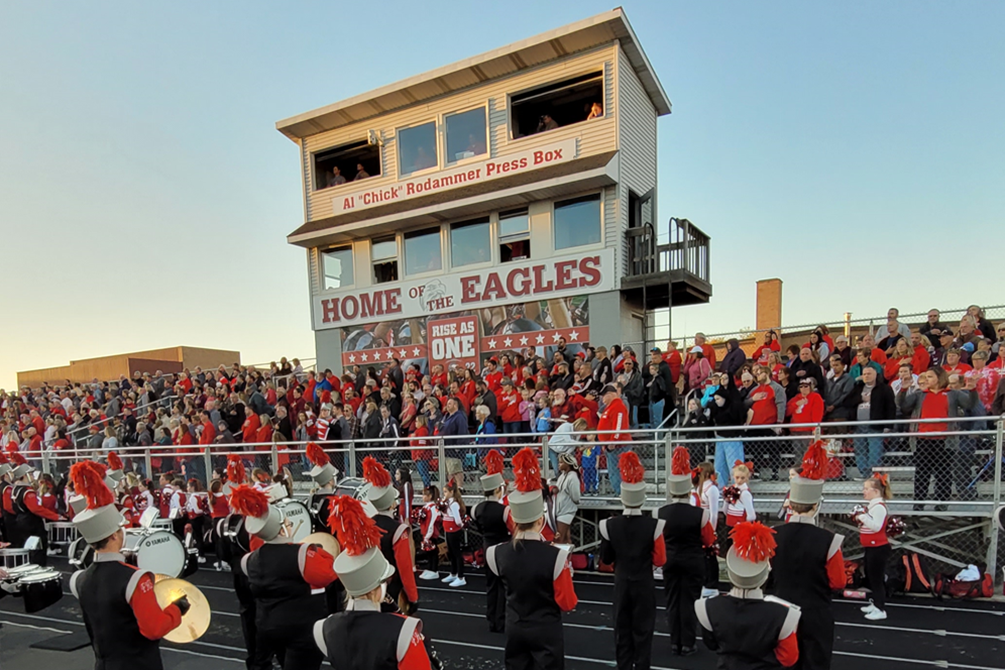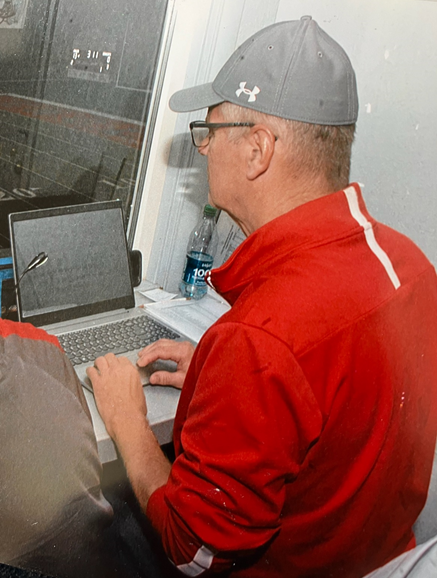
#TBT: Searching for The Hinker Bell
September 28, 2017
By Geoff Kimmerly
Second Half editor
Menominee will host Escanaba on Friday in the 121st meeting between two of the Upper Peninsula’s largest high schools and proudest football programs – but with the trophy celebrating the game still missing after it first disappeared more than half a century ago.
The two teams from 1948-1962 played for the The Hinker Bell, a locomotive bell that hasn’t been seen since 1963.
A decade ago, Escanaba Daily Press sports editor (and now Second Half correspondent) Denny Grall wrote about a newfound search for The Hinker Bell. But the mystery continues, and Grall’s story below tells of many of the twists and turns that to that point that had come in trying to locate it.
ESCANABA — Another search is underway to find the Hinker Bell.
The former locomotive bell went to the winner of the Escanaba-Menominee football game for about 15 years but has been missing for more than 40 years. It came from a locomotive owned by the Bay de Noquet Company and used on the LS&I Railroad that operated in Delta and Menominee counties.
The locomotive was built in 1906 by Baldwin Locomotive Works in Philadelphia and the bell was believed to have been cast in the railroad foundry, according to a 1953 newspaper clipping.
In 1948, one of the locomotive owners presented the bell to his friend, John Hinker of Menominee, an ardent sports fan who donated materials for the press box at Menominee’s Walton Blesch Field.
 Hinker gave the bell to then Menominee coach Mickey McCormick and indicated proper use for the bell would be as an award for the gridiron rivalry.
Hinker gave the bell to then Menominee coach Mickey McCormick and indicated proper use for the bell would be as an award for the gridiron rivalry.
Now Hinker’s great great nephew is trying to find the bell, which has not been seen since Escanaba’s current high school opened in 1963.
Tim Waters of Land O’ Lakes, Wis., who has launched the search, became interested by researching his family tree. “It is a big trophy (between 80 and 150 pounds by various estimates) and it is odd that it is missing,” Waters said in a recent telephone chat.
“One theory is that it is in somebody’s hunting camp or a home and they are using it as their own trophy,” said Waters.
“We have a pretty good investigation going on and all help is appreciated. If somebody does have it, we’re not looking to prosecute them. We’re just looking to get the darn thing back. Nobody will be in trouble.”
Waters refuted the old idea the bell was melted down. He has contacted numerous bell collectors, and they said a junk yard would have known it was worth a lot more than melted metal.
“The bell was not destroyed. We’ve come to that conclusion,” he said. “It was not put in a scrap yard.”
Waters contacted Coplan Iron and Metal of Escanaba and learned that bells were not melted or crushed and said the firm never accepted a bell with engravings matching the Hinker Bell.
Waters learned those businesses would sell them for the weight value to people who wanted them for yard ornaments/dinner bells, or to collectors.
“It is a treasure and it needs to be found,” said Waters.
Waters said the last known photo of the bell was with then EHS football coach Al Sigman and Esky players John Fisher and Phil Davidson in 1960. Escanaba beat Menominee from 1959-63 but could not find the bell in 1964 when the Maroons won. No one he has talked to remembers seeing the bell present at the first three games during the tenure of coach Jerry Cvengros.
The current Escanaba High School opened in 1963 and Bay de Noc Community College then occupied the old facility, which has since been demolished.
“Records indicate there was no report (of a missing bell) filed by Escanaba school district to the police department,” Waters said.
“The Hinker Bell is part of U.P. Michigan’s history, as is football and the railroads,” Waters said. “The people of Escanaba and Menominee deserve to have this trophy returned to their high schools.”
Waters, who has never seen an Escanaba or Menominee football game but is planning to rectify that omission this season, is hoping students at the two schools will join in the treasure hunt and talk about it with their parents and grandparents.
He has already contacted EHS athletic director Rob Ryan, who plans to thoroughly search the school basement.
He would like to find a photo of the bell to help collectors in their search. “Each bell was for a special locomotive,” said Waters.
“If they have a good picture we can pass it around and say we are looking for this bell. If they can pinpoint what this bell was on, they can help get the word out.”
He has also extended the search to the website at upfootball.com, which has generated interest but no bell. “If the bell is in the area still today, I don’t think it will take long to surface,” he said.
“If we don’t find this bell, we are going to try to make up a replacement as close as possible if the two schools are interested in that,” he said.
Waters is hoping that real estate agents, postal workers, delivery personnel, construction workers, etc., may have seen the bell during their travels and can help retrieve it.

Rodammer Stacks 44 Years, 451 Games Tracking Frankenmuth's Football Numbers
By
Steve Vedder
Special for MHSAA.com
September 20, 2024
While Al Rodammer's abbreviated scouting career may have lasted all of one night, it didn't take him long to figure out how he'd spend Friday evenings for the next 44 years.
Rodammer remembers being asked by former Eagles football coach Ralph Munger to drive to Bullock Creek to scout an upcoming playoff opponent. But Rodammer and fellow scout Jeff Reinbold wound up getting lost en route and missed most of the first quarter.
The mix-up didn't sit well with Munger, who "reassigned" Rodammer to a different task: keeping stats for the program.
Instead of fretting about the switch, Rodammer, a former baseball and basketball player at Frankenmuth, embraced the move. Four and a half decades later, Rodammer has kept track of virtually every football stat you can imagine for 451 Eagles games. Starting in 1981, Rodammer has dragged, at first, his trusty pencil and paper, and now laptop to hundreds of cramped press boxes, unsteady roof tops, chilly sidelines or whatever dinky corner space may have been available.
Many people may believe that totaling rushing yards or deciphering passing percentages is a thankless task. The 70-year-old Rodammer, who had the Frankenmuth press box named after him in 2022, prefers to think of his work as a labor of love.
Acting as a bridge between past and present Eagles teams and staying in touch with a community which loves its Friday Night Lights is his way of honoring a highly-successful football program.
 "It's a commitment, but it's also a labor of love," he said. "When they named the press box after me, I thought, "Gosh, I don't know if I deserve this.' I don't do it for the recognition. But when the alumni come back, and to see what the work means to them, that's what I get out of it."
"It's a commitment, but it's also a labor of love," he said. "When they named the press box after me, I thought, "Gosh, I don't know if I deserve this.' I don't do it for the recognition. But when the alumni come back, and to see what the work means to them, that's what I get out of it."
Rodammer's connection with the program far exceeds keeping track of how many passes are attempted or how many yards the Eagles' defense surrenders. He's written two books about the program, including an 82-page history of the Frankenmuth-Millington rivalry. While his initial connection may have been as a failed scout, he's recognized as the program's official historian and leading goodwill ambassador as he's constantly stopped on the street and asked what the Eagles’ chances are for the upcoming season.
One of Rodammer's passions is organizing reunions of past teams, a couple of which included his two sons who played football at Frankenmuth.
When you consider all of Rodammer's contributions to the program, Frankenmuth coach Phil Martin said keeping stats is just a small part of his overall contribution to the program. The data turned in to coaches helps them plot offensive and defensive strategies. But Rodammer's work in writing game stories for community media, digging into archives for long-sought but pertinent information and communicating with past teams is his true value.
"But more than statistics, he's cared for the program for 40-plus years," Martin said. "He's helped tradition and the community in understanding what we have in 69 years of Frankenmuth football."
Rodammer, whose statistics career has covered a half-dozen athletic directors and five head coaches, takes particular pride in not just assembling the typical Friday night numbers, but in putting the long history of Eagles football into perspective. His boundless research of Frankenmuth football has taken him from local libraries to Detroit-area facilities which may contain older stories on the team. He uses that information to ensure the accuracy of his records.
"We've been successful in a lot of athletics like soccer or basketball, but Frankenmuth is a football town," said Rodammer, who added tabulating junior varsity statistics to his resume in 2002. "There's something about football that brings out the community. There are always a lot of older people in the stands who get into it.
"Athletics has a definite impact on the community, no doubt about it."
 Rodammer has missed only four games over his 44 seasons, 28 of which he has been joined by spotter Frank Bender. Two were for weddings, there was one funeral and once the fastpitch softball team he played for was in Minot, N.D., for a tournament. Rodammer is a member of the American Softball Association Hall of Fame.
Rodammer has missed only four games over his 44 seasons, 28 of which he has been joined by spotter Frank Bender. Two were for weddings, there was one funeral and once the fastpitch softball team he played for was in Minot, N.D., for a tournament. Rodammer is a member of the American Softball Association Hall of Fame.
He admits to being a "numbers guy," who developed programs for the Vassar Building Center before retiring 13 years ago, and he also kept statistics for his softball team for 20 years. Rodammer has his own definition of what numbers mean to him.
"I was only an average student, but there is something about stats," he said. "Yeah, I'm probably a little geekish about numbers."
Making the job easier – if not more fun – has been the wild success of the Frankenmuth program. The Eagles have won 62 consecutive conference games, including 12 league titles. Frankenmuth has been to two MHSAA Finals at Ford Field over the last four seasons. The Eagles have had 14 consecutive winning seasons, been to the playoffs 13 straight years and 29 times since 1987. The team is off to a 3-0 start this season and last week became the 14th program in state history to reach 500 victories.
Such success has left Rodammer with more than a few memories. For instance, he lists the team's 1987 playoff upset of Cheboygan as his personal favorite moment. Cheboygan was unbeaten, but the unraked Eagles prevailed 28-21. He also mentions a 28-20 win over powerhouse Ithaca in 2016 that interrupted a stunning string of Yellowjackets successes during an 118-5 run that included four MHSAA Finals titles and two more runner-up finishes between 2009-17. Another memory is Frankenmuth playing in its first championship game at a near-empty Ford Field due to COVID restrictions in January 2021.
Rodammer is hard-pressed to answer what he'd do with his Friday nights if he wasn't toiling away in a press box at a Frankenmuth football game. Maybe he'd work closer with his church, travel to see other local teams play or check off a couple stops toward his ultimate goal – to visit every Big 10 school for a game.
For the moment, at least, skipping a Friday night perched on a rickety chair tucked into the corner of a cramped press box isn't in the plan.
"I have a passion, but I don't do it for recognition," he said of connecting with the Eagles program "I want to keep a commitment from past teams to the present. That's what motivates me.
"I love summers, but every year I can't wait for the fall."
PHOTOS (Top) Al Rodammer, left and Eagles coach Phil Martin take a photo on the night the facility was named for its longtime stat person during the 2022 season. (Middle) The Al "Chick" Rodammer Press Box stands tall before the start of a Frankenmuth game this season. (Below) Rodammer does his work in the corner of the press box. (Top two photos by Chip DeGrace; below photo courtesy of Al Rodammer.)

